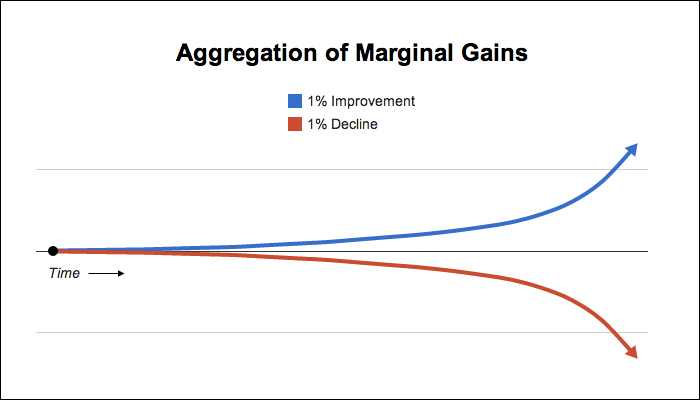
Marginal gains is like the life version of compound interest. It is based around the idea that improving everything that you do by small increments of 1% aggregate in the end to large scale changes.
The idea was introduced to me by my old boss. As a keen cyclist, he had read and studied the strategy that Sir Dave Brailsford took with Team Sky when he became team leader in 2010. Here is a background (taken from http://jamesclear.com/marginal-gains):
In 2010, Dave Brailsford faced a tough job.
No British cyclist had ever won the Tour de France, but as the new General Manager and Performance Director for Team Sky (Great Britain’s professional cycling team), Brailsford was asked to change that.
His approach was simple.
Brailsford believed in a concept that he referred to as the “aggregation of marginal gains.” He explained it as “the 1 percent margin for improvement in everything you do.” His belief was that if you improved every area related to cycling by just 1 percent, then those small gains would add up to remarkable improvement.
They started by optimizing the things you might expect: the nutrition of riders, their weekly training program, the ergonomics of the bike seat, and the weight of the tires.
But Brailsford and his team didn’t stop there. They searched for 1 percent improvements in tiny areas that were overlooked by almost everyone else: discovering the pillow that offered the best sleep and taking it with them to hotels, testing for the most effective type of massage gel, and teaching riders the best way to wash their hands to avoid infection. They searched for 1 percent improvements everywhere.
Brailsford believed that if they could successfully execute this strategy, then Team Sky would be in a position to win the Tour de France in five years time.
He was wrong. They won it in three years.
In 2012, Team Sky rider Sir Bradley Wiggins became the first British cyclist to win the Tour de France. That same year, Brailsford coached the British cycling team at the 2012 Olympic Games and dominated the competition by winning 70 percent of the gold medals available.
In 2013, Team Sky repeated their feat by winning the Tour de France again, this time with rider Chris Froome. Many have referred to the British cycling feats in the Olympics and the Tour de France over the past 10 years as the most successful run in modern cycling history.
It may seem pretty obvious but generally people focus on the bigger goal rather than taking on a smaller challenge and building on that. For example, why do so many students cram when it comes to exam time, when really it’s far easier to learn 1% of the course each day for 100 days than learn 50% of the course the week before the exam (obviously there is some temporal discounting here, but it still applies in the same way).
Examples of 1% gains could be only taking the stairs, carrying a company branded pen on you at all times when at work or with a client, taking multivitamins; essentially easy things to do that after a specific time period, can provide exponential benefits when aggregated.
5 Little Things To Do As A Trader To Make Marginal Gains
As a trader, incorporating marginal gains is vital. Here are our top 5 ways to make small improvements that lead to big changes.
- Examine your journal weekly, and monthly and identify strengths and weaknesses. Always seek to understand either why you are profitable or why you are losing. Challenge yourself to see how you can optimise your strategy to achieve even better results.
- Have a more comfortable environment to trade in. A better chair, a fan if it’s warm, a hand rest for your keyboard/mouse.
- Get adequate sleep. You cannot make decisions correctly if you have not rested. This may sound basic but many people do not get enough sleep.
- Set up your platform correctly and understand shortcuts. MetaTrader 4 has so many shortcuts and macros that you can programme to submit manual orders quickly etc. Having confidence in your ability to use your tools can boost performance.
- Take breaks. If you know that your best period of trading is done between 8am-12pm and then 4pm-6pm, why are you going to be at the computer, scared about missing a trade between 12pm and 4pm? Go out and relax.
Check out (whichever automatic trading journal software we choose to partner with) and sign up below.
Credit/Source: https://davidbellefx.com











